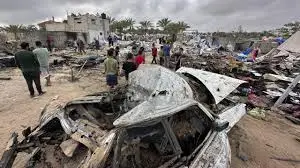UK, France, Canada threaten sanctions against Israel if it continues new offensive in Gaza

May 20, 2025 — In a significant shift in diplomatic tone, the United Kingdom, France, and Canada have issued a stern joint warning to Israel, threatening targeted sanctions if the Israeli government does not halt its renewed military offensive in Gaza and ease restrictions on humanitarian aid.
The joint statement, released by the offices of British Prime Minister Keir Starmer, French President Emmanuel Macron, and Canadian Prime Minister Justin Trudeau, signals growing international impatience with Israel’s prolonged military operations in the Gaza Strip, which began following the October 2023 Hamas-led attacks.
Humanitarian Crisis Drives Shift in Stance
The three Western allies cited the worsening humanitarian situation in Gaza as their central concern. Despite a brief easing of border controls—allowing a limited convoy of United Nations aid trucks into northern Gaza—the scale of the humanitarian catastrophe has continued to escalate. Aid agencies report that hundreds of thousands of civilians are on the brink of famine, with access to clean water, shelter, and medical care severely restricted.
“The situation on the ground is intolerable,” the leaders said in the statement. “Israel must immediately cease its offensive and allow unhindered humanitarian access into Gaza. Continued inaction will compel us to take further steps, including targeted sanctions.”
The unified position by the UK, France, and Canada marks a departure from their earlier approach of cautious support for Israel’s right to self-defense. This new stance appears to reflect both the high civilian death toll—exceeding 53,000 according to Gaza’s Health Ministry—and mounting public pressure at home to hold Israel accountable for potential violations of international humanitarian law.
Growing Diplomatic Isolation for Israel
Israel’s Prime Minister Benjamin Netanyahu has remained defiant in the face of international criticism, insisting that the offensive is necessary to dismantle Hamas’s military infrastructure and ensure long-term Israeli security. Netanyahu has also stated that Israel seeks to take full control of Gaza’s security apparatus, raising concerns about the potential re-occupation of the Strip.
In recent weeks, U.S. President Joe Biden has also called for restraint, although the U.S. has stopped short of supporting sanctions. However, with key allies now threatening economic and political consequences, Israel faces increasing diplomatic isolation.
The European Union has already begun informal discussions around potentially expanding the bloc’s list of sanctioned Israeli individuals and entities linked to settlement expansion and military operations in occupied Palestinian territories. Human rights organizations are also urging the International Criminal Court to investigate alleged war crimes committed by both Israel and Hamas.
A New Red Line: Settlements in the West Bank
In addition to criticizing Israel’s military actions in Gaza, the joint statement from London, Paris, and Ottawa also condemned ongoing settlement expansion in the occupied West Bank. The leaders reaffirmed their long-standing position that Israeli settlements are illegal under international law and pose a direct threat to the viability of a two-state solution.
“We are deeply concerned by the continued displacement of Palestinians in the West Bank and the aggressive expansion of settlements,” the statement read. “These actions undermine the prospects for peace and contribute to regional instability.”
Public Sentiment and Political Pressures
In all three countries, political leaders are feeling the heat from vocal pro-Palestinian advocacy groups and growing domestic opposition to what is perceived as one-sided support for Israel. In the UK, Prime Minister Starmer has come under increasing pressure from within his own Labour Party to adopt a firmer stance. The Canadian parliament recently debated a motion calling for arms export restrictions on Israel, and in France, large-scale protests have drawn attention to the civilian cost of the Gaza war.
Polls conducted across Europe and North America show that public opinion is rapidly shifting in favor of imposing conditions on military aid and economic cooperation with Israel unless significant changes are made in its Gaza strategy.
Israel’s Response
In response to the joint warning, Israeli officials issued a brief statement defending their position. “Israel will not allow Hamas to regroup and continue posing a threat to Israeli citizens,” said a spokesperson from the Prime Minister’s Office. “We are acting within our right to defend our people. Any sanctions would be deeply regrettable and counterproductive to regional stability.”
Despite these statements, there appears to be growing tension even within the Israeli security establishment. Several former military officials have expressed concern that the current strategy is unsustainable and may backfire diplomatically.
The Road Ahead
With the situation in Gaza deteriorating and Israel’s international partners increasingly divided over how to respond, the coming weeks are likely to be critical. If Israel continues its military operations without significantly increasing humanitarian access, the UK, France, and Canada may move forward with sanctions—marking a pivotal shift in Western policy.
Such a move could also embolden other nations to follow suit, reshaping the geopolitical landscape surrounding the Israel-Palestine conflict and potentially setting the stage for renewed international pressure toward a long-term peace agreement.






